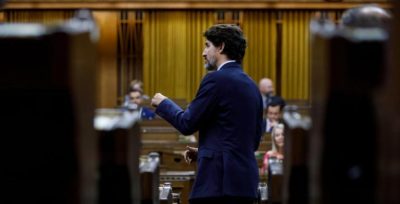Trudeau Faces Series of Setbacks to Corporate, Imperial Policies

All Global Research articles can be read in 27 languages by activating the “Translate Website” drop down menu on the top banner of our home page (Desktop version).
***
As much as some Canadians would like to believe their country is a force for good in the world, the truth is more sobering. Extreme inequality is rampant and the Canadian government is an important supporter of corporate power and imperialism in global affairs. The good news is that the pushers of the unfair, unjust and immoral existing world order do not always get their way.
It is uplifting to tally some of the Trudeau government’s setbacks:
- Last Friday the International Criminal Court ruled that it has jurisdiction over Israeli war crimes committed in the Palestinian territories, which should pave the way for a possible criminal investigation. A year ago the Trudeau government sent a letter to the ICC saying it didn’t believe the court had jurisdiction over Palestine. Its letter implied it could sever funding to the ICC if the court pursued an investigation of Israeli crimes. After the recent decision new Foreign Minister Marc Garneau released a statement criticizing the ICC decision.
- On January 26 former Liberal finance minister Bill Morneau withdrew his bid to lead the Organisation for Economic Cooperation and Development (OECD) countries after it was determined he had no chance of winning.
- On January 22 the Treaty on the Prohibition of Nuclear Weapons (TPNW) entered into force, making weapons that have always been immoral also illegal under international law. Canada voted against holding the 2017 UN Conference to Negotiate a Legally Binding Instrument to Prohibit Nuclear Weapons, Leading Towards their Total Elimination and boycotted the TPNW negotiating meeting, which two-thirds of the world’s countries attended.
- On January 20 new US President Joe Biden revoked the permit for the Keystone XL pipeline. The Trudeau government pressed the president-elect to break a direct promise and maintain a climate-destroying pipeline okayed by Donald Trump.
- Since Venezuela’s new National Assembly began sitting on January 6 numerous countries have withdrawn from the US–Canada led campaign to anoint Juan Guaidó President. The European Union dropped its de facto recognition of Guaidó. As did the Dominican Republic. Even the Ottawa-led Lima Group has softened its stance. Last week Panama withdrew the credentials of Guaidó’s ambassador.
- In October Chileans voted overwhelming to rewrite the country’s Pinochet-era constitution. The referendum was a blow to Canadian corporations operating in Chile and the Trudeau government’s alliance with right-wing governments in the hemisphere.
- A week earlier Bolivia’s Movimiento al Socialismo won a decisive election victory that was a rejection of the Canadian-backed coup against Evo Morales a year earlier. The overwhelming results were also a blow to Ottawa’s bid to wipe out the remnants of the leftist pink tide in Latin America. (On Sunday an ally of leftist former President Rafael Correa, Andrés Arauz, gained the most votes in the first round of Ecuador’s presidential election.)
- In June the international community decisively rejected Trudeau’s foreign policy. They voted against Canada’s bid for a seat on the United Nations Security Council by a larger margin than a decade earlier under Stephen Harper.
People who support a fairer, more just and equal world should take comfort from these defeats for the Trudeau government’s pro-corporate and imperial policies. Proof that the bad guys are not invincible should offer hope for bigger victories to come.
*
Note to readers: please click the share buttons above or below. Forward this article to your email lists. Crosspost on your blog site, internet forums. etc.
Featured image is from Yves Engler

